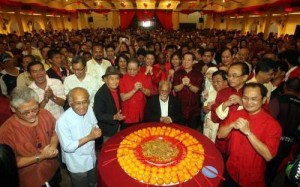The Prime Minister-in-waiting, Datuk Seri Najib Razak, who has taken over as Perak UMNO and Barisan Nasional leader, should stop the attempt at the illegal and unconstitutional grab for power in Perak and respect the constitutional process and the mandate of the people of Perak.
The Perak Pakatan Rakyat Mentri Besar Datuk Seri Mohammad Nizar Jamaluddin yesterday had an audience with the Sultan of Perak, Sultan Azlan Shah to seek the dissolution of the Perak State Assembly and to hold state election, as returning the mandate to the voters is the most honourable and democratic manner to resolve the political crisis in Perak.
In his book “Constitutional Monarchy, Rule of Law and Good Governance” (2004), the former Lord President wrote:
“Under normal circumstances, it is taken for granted that the Yang di-Pertuan Agong would not withhold his consent to a request for dissolution of parliament. His role is purely formal.”
He also pointed out that no sultan or agung had withheld consent to dissolve legislative body, except in Kelantan in 1977.
While the Sultan’s decision on the Mentri Besar’s request for dissolution of the Perak State Assembly is awaited, it is most improper and unconstitutional for Najib to attempt an illegal and unconstitutional grab for power in Perak state to frustrate the will and wishes of the people of Perak in the March general election last year. Continue reading “Najib should stop illegal and unconstitutional power grab in Perak”

